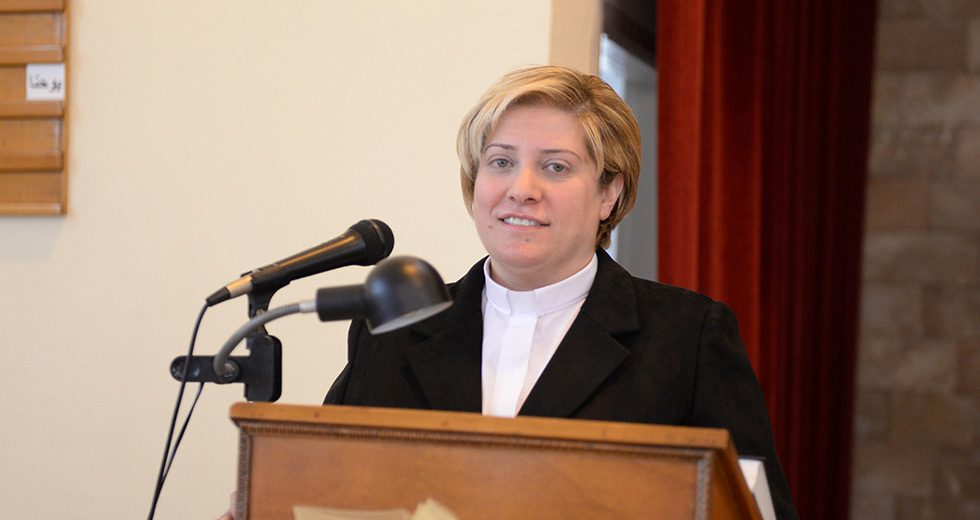
Profile: Rola Sleiman
The World Communion of Reformed Churches is particularly committed to gender justice and the just and full participation of women in all areas of church and society. The 2017 General Assembly adopted “The Declaration of Faith on the Ordination of Women” and pledged to journey with those members who do not yet ordain women. The ordination of women is not just about having more women in the ministry; rather it’s about recognizing that by including women in ministry and as equals in church leadership would create a powerful force for social and economic justice throughout the world. This is one in a series of articles on women in ministry highlighting these beliefs.
“Being an ordained minister is a true and live demonstration of God’s love and equality.”
“Change needs time, patience and prayer. It happened in the Arab World and in a Muslim majority city, Tripoli in Lebanon; it can happen everywhere in the world,” said Rola Sleiman while discussing her ordination as a minister.
Sleiman, the first female pastor in the Arab Christian world grew up as a church-going girl who later decided to study theology. She studied at Tripoli Evangelical School for boys and girls, a school that belongs to the National Evangelical Synod of Syria and Lebanon (NESSL). For high school she went to the Near East School of Theology and obtained her Bachelor of Theology in Christian Education.
At 14-years-old, Sleiman started asking deep questions about life and what really gives it meaning, especially to a girl living in the Middle East. She pondered questions of finding truth, including why she was born into an evangelical family in a Muslim-majority country.
After studying some parts of the Quran, the Old Testament and the New Testament she fell in love with the young man from Nazareth, Jesus Christ, who changed the world with his love, sacrifice and compassion.
“I said this theology I want to adopt, this person I want to follow and such principals I want to preach. I logically became a believer,” said Sleiman.
She was ordained on 26 February 2017 as the first female pastor in Lebanon, the Arab world and the Middle East.
Explaining how she became the first female pastor, she recalls the challenges on her way.
“In my country Lebanon—and throughout the Middle East—it was known that it is not possible for a woman to be a clergy. It never happened before in all the churches. There are huge social and cultural difficulties and barriers, not to mention that we live in a merely patriarchal society where female leadership is not well appreciated,” said Sleiman.
She explained that 50 years ago in Syria and Lebanon, the Presbyterian Church ordained women as elders. Not all churches ordained women elders but the majority of the Synod Presbyterian congregations did, which meant that women were a part of the decision-making process in the church and part of the session of the church despite not being ministers.
Recalling the debate about ordaining women as ministers, she said that the problem was not theological but social, with questions such as: “Which church will ask her to be their pastor? Who will accept a women pastor in a patriarchal society and among a majority of Orthodox and Catholic churches? How will she build relationships with other churches? The more conservative Evangelicals? The Muslims?”
She added that the Fellowship of Middle East Evangelical Churches met around eight years ago and agreed on a statement that churches should start ordaining women to serve the Sacraments. Everyone signed that statement but it was only on paper.
“If you asked me or anyone else five or ten years ago, are we going to see a female ordained minister in the Arab world, I would have answered maybe in 50 or 100 years. Fortunately, more than a year ago, this situation has changed,” said Sleiman.
According to Sleiman the change happened because the church in Tripoli asked for her to be ordained. In the late 1990s, Sleiman was appointed by NESSL to serve in the Bekaa Valley as a Christian educator. She moved to Tripoli in 2002 as the church’s Christian educator, but often substituted for the pastor when he traveled. In 2008 she became the church’s de facto pastor, preaching and offering care to the congregation until her ordination almost a decade later.
“In this case there are no more social reasons to stand against the ordination, and this was the key change. To me being an ordained minister is a true and live demonstration of God’s love and equality. It means giving the right that Jesus granted to women in ministry and fulfilling the equality that Jesus our Lord planted,” said Sleiman.
Sleiman believes that every woman has a role in the life of the church and to plant a seed of hope and light a candle in a dark world. No man and no earthly authority can deprive faithful women from serving God.
“Women surely have plenty of values to offer to the church of Christ, but we have to believe in ourselves, in our abilities and our spiritual talents. We as women are able to embrace a human being in our womb. When God decided to be incarnated and come to this world as a human figure, he was born in the womb of a simple, faithful woman. Just keep the faith and you can make a difference in your world,” said Sleiman.
 World Communion of Reformed Churches
World Communion of Reformed Churches